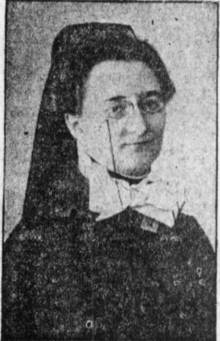Henriette Arendt
Henriette Arendt | |
|---|---|
 | |
| Born | 11 November 1874 |
| Died | 22 August 1922 (aged 47) Mainz, Germany |
| Relatives | Hannah Arendt (niece) |
Henriette Arendt (11 November 1874 – 22 August 1922) was a German writer and policewoman. She is known because she was one of the earliest women to be a police officer, being a policewoman in 1903.
She was the aunt of philosopher and historian Hannah Arendt.
Early life
[edit]Arendt was born in Königsberg in 1873. Her father, Max, was a Jewish merchant. Arendt was educated in her home town before she completed her studies in Geneva and Berlin. She could speak German, Russian, French and Italian fluently. She became a nurse.[1]
Law enforcement career
[edit]Arendt's entry into the police was unusual. She had approached a prison doctor to ask if there were vacancies for nurses in the prison hospital. He told her that there were none, and jokingly mentioned that the police were looking for an old woman to supervise arrested women in the cells.
Despite being only 28 years age, Arendt applied and was given the job. Negotiation was required to arrive at the job title of "Police Assistant". She is known because she was a policewoman in 1903 in Stuttgart, as well as the only policewoman in Europe.[2]
Arendt was enthusiastic about her role; this caused conflict with her employers. She learned English and introduced herself as Europe's only policewoman.[2] She had been hired to help with arrests of suspected prostitutes, but she gave talks and published essays on the problems she saw.[3] Eventually, Arendt resigned under pressure from her superiors.[4]
She subsequently moved to Switzerland where she worked in support of orphaned children and campaigned against the international trafficking of children.[2] She reported on her work in particular in Erlebnisse einer Polizeiassistentin (1910).[5][6]
Arendt died in Mainz in 1922.
References
[edit]- ^ Henrietta Arendt
- ^ a b c "Europe's One Policewoman". The Boston Globe. 2 August 1914. p. 56. Retrieved 8 April 2019 – via newspapers.com.
- ^ Police Officer Henny, in German
- ^ History Archived 2018-02-18 at the Wayback Machine, European Network of Policewomen, in German, retrieved 22 January 2015
- ^ Riepl-Schmidt 2005.
- ^ Arendt, sister Henriette (1910). Erlebnisse einer polizeiassistentin. Süddeutsche monatshefte, G.M.B.H.
Bibliography
[edit]- Riepl-Schmidt, Mascha (15 February 2005). "Henriette Arendt". HannahArendt.net (in German). 1 (1). ISSN 1869-5787.
